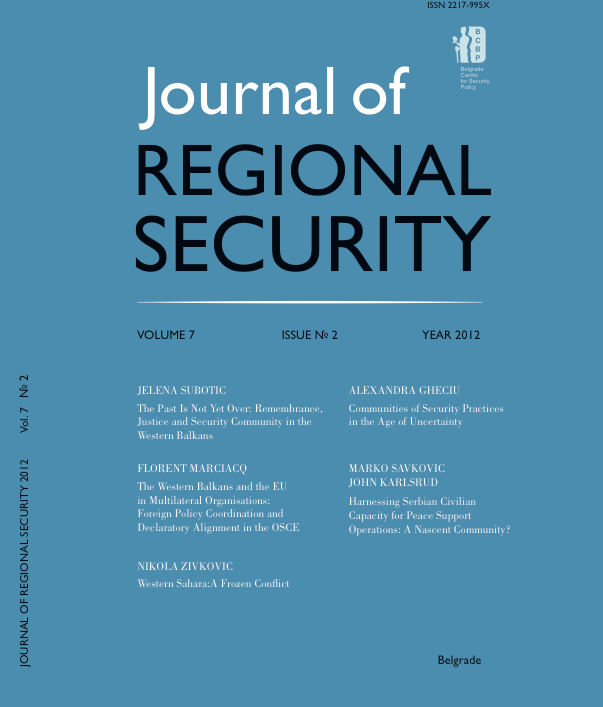Communities of Security Practices in the Age of Uncertainty
Abstract
This paper examines some of the challenges involved in recent efforts to create a new community of practice that brings together – within the domain of peacebuilding – NATO and humanitarian actors. In recognition of the need to promote systematic cooperation between the alliance and the humanitarian community, NATO has launched several initiatives aimed at constructing a domain of shared knowledge and common procedures, and, on this basis, cultivating mutual trust and a sense of membership in the same community between representatives of the alliance and members of the NGO community. While these initiatives have enjoyed a certain degree of success, at the deeper level the process of forging a new community of practice among these actors remains challenging and fraught with tension. This process has been rendered particularly complicated by the fact that some of the new initiatives challenge fundamental assumptions about self-identity and purpose both in NATO and within the humanitarian community. Indeed, efforts to construct a new community of practice in the domain of peacebuilding both reflect and contribute to intense debates and contestations within the Atlantic Alliance as well as among NGOs about their evolving identities and, linked to that, appropriate logics of action in the future.
References
Adler, Emanuel. 2008.“The Spread of Security Communities: Communities of Practice, Self-Restraint, and NATO’s Post-Cold War Transformation.” European Journal of International Relations 14(2): 195–230.
Adler, Emanuel and Vincent Pouliot, eds. 2011. International Practices. Cambridge: Cambridge University Press.
Fox, Edward. 2011.“Preparing Civilians for Deployment to Civilian-Military Platforms in Combat Environments: The Evolution of Staffing and Training for the Civilian Mission in Afghanistan.” In Towards a Comprehensive Approach: Strategic and Operational Challenges, edited by Christopher Schnaubelt. NATO Defence College Forum Paper no.18.
Gheciu, Alexandra. 2005.NATO in the ‘New Europe’. Palo Alto: Stanford University Press.
Gheciu, Alexandra. 2008. Securing Civilization? Oxford: Oxford University Press. Gheciu, Alexandra. 2011.“Divided Partners: The Challenges of Civil-Military Cooperation in Peacebuilding Operations.” Global Governance15 (1): 95–114.
Gheciu, Alexandra.2012. “In Search of ‘Smart Defence’”. CIPS Policy Brief, University of Ottawa.
Gross Stein, Janice. 2011. “Background knowledge in the foreground: conversations about competent practice in ‘sacred space.’” In International Practices, edited by Emanuel Adler and Vincent Pouliot. Cambridge: Cambridge University Press.
LaRose-Edwards, Paul. 2008.“NATO and Militaries as Trusted Partners in Civil- Military Interaction.”The Pearson Papers 11 (1): 22–43.
McChrystal, Stanley. 2009. Initial United States Forces–Afghanistan (USFOR-A) Assessment. Memo to Secretary Gates.
Médecins Sans Frontières. 2011. Humanitarian Action: At Any Price? Paris: Annual Report.
Minear, Larry, Ted van Baarda and Marc Sommers. 2000.“NATO and Humanitarian Action in the Kosovo Crisis.”Occasional Paper, Watson Institute for International Studies, Brown University.
Paris, Roland and Timothy D. Sisk, eds. 2009. The Dilemmas of Statebuilding: Confronting the Contradictions of Postwar Peace Operations. London: Routledge.
Pouliot, Vincent.2008. “The Logic of Practicality: A Theory of Practice of Security Communities.” International Organization 62: 257–288.
Rasmussen, Anders Fogh. 2010.“ NATO and NGOs.”In Voltaire Network, available at: www.voltairenet.org/a164724
Rollins, John W. 2001.“Civil-Military Cooperation (CIMIC) in Crisis Response Operations: The Implications for NATO.”International Peacekeeping8 (1): 122–129.
William, Michael J. 2009. NATO, Security and Risk Management: From Kosovo to Kandahar. London and New York: Routledge.
Authors retain copyright of the published papers and grant to the publisher the non-exclusive right to publish the article, to be cited as its original publisher in case of reuse, and to distribute it in all forms and media.
The published articles will be distributed under the Creative Commons Attribution 4.0 International License (CC BY). It is allowed to copy and redistribute the material in any medium or format, and remix, transform, and build upon it for any purpose, even commercially, as long as appropriate credit is given to the original author(s), a link to the license is provided and it is indicated if changes were made. / The published articles will be distributed under the Creative Commons Attribution ShareAlike 4.0 International license (CC BY-SA). It is allowed to copy and redistribute the material in any medium or format, and remix, transform, and build upon it for any purpose, even commercially, as long as appropriate credit is given to the original author(s), a link to the license is provided, it is indicated if changes were made and the new work is distributed under the same license as the original.
Users are required to provide full bibliographic description of the original publication (authors, article title, journal title, volume, issue, pages), as well as its DOI code. In electronic publishing, users are also required to link the content with both the original article published in Journal of Regional Security and the licence used.
Authors are able to enter into separate, additional contractual arrangements for the non-exclusive distribution of the journal's published version of the work (e.g., post it to an institutional repository or publish it in a book), with an acknowledgement of its initial publication in this journal.
Authors are permitted to deposit author’s pre-print / author’s post-print (accepted version) / publisher's version (PDF) of their work in an institutional repository, subject-based repository, author's personal website (including social networking sites, such as ResearchGate, Academia.edu, etc.), and/or departmental website prior or during the submission process / at any time after the acceptance of the manuscript / at any time after publication.
Full bibliographic information (authors, article title, journal title, volume, issue, pages) about the original publication must be provided and links must be made to the article's DOI and the license.

